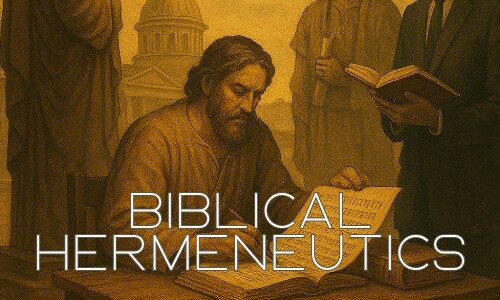This course teaches the principles and methods of biblical interpretation. It focuses on how to determine the original meaning of a text by considering its literary, historical, and cultural context, and how to apply those principles responsibly to contemporary situations.
Biblical Hermeneutics
Level: Master’s
Course Length: 10 weeks (approx. 120–150 hours total if following full module path)
Delivery Mode: Competency-based, self-paced with required final exam
Course Overview
This course introduces the principles and methods of biblical interpretation (hermeneutics). Students will learn how to approach the text of Scripture responsibly, seeking its original meaning within its historical, literary, and cultural settings, and how to bridge that meaning to contemporary application.
The course is competency-based:
-
Students may complete all modules and assignments to prepare for the final exam, or
-
If students already have prior knowledge, they may skip directly to the final competency exam.
Successful completion requires demonstrating mastery of hermeneutical principles through the final exam.
Learning Outcomes
By the end of this course, students will be able to:
-
Explain the history and development of biblical interpretation.
-
Identify and apply key hermeneutical principles across biblical genres.
-
Analyze the literary, historical, and cultural contexts of biblical texts.
-
Evaluate theological and contemporary applications of Scripture.
-
Demonstrate interpretive competence on selected passages.
Weekly Breakdown (10 Weeks)
Week 1: Introduction to Hermeneutics (8–10 hours)
-
What is hermeneutics?
-
Distinction between exegesis and eisegesis.
-
Historical overview of interpretation (Jewish, Patristic, Medieval, Reformation, Modern).
Week 2: The Nature of Scripture & Authorial Intent (10–12 hours)
-
Inspiration, authority, and canon of Scripture.
-
The role of divine and human authorship.
-
The importance of authorial intent in interpretation.
Week 3: Historical and Cultural Context (12–14 hours)
-
Socio-political background of the Ancient Near East and Greco-Roman world.
-
Jewish traditions and Second Temple Judaism.
-
Use of background tools (archaeology, historical sources).
-
Competency: Demonstrate contextual analysis on a selected passage.
Week 4: Literary Context & Biblical Genres (12–14 hours)
-
Interpreting narrative, poetry, prophecy, wisdom literature, gospels, epistles, and apocalyptic writings.
-
Genre-specific rules for interpretation.
-
Competency: Distinguish interpretive approaches across genres.
Week 5: Word Studies & Biblical Languages (10–12 hours)
-
Introduction to Hebrew and Greek word studies.
-
Semantic range and dangers of “word fallacies.”
-
Use of concordances, lexicons, and software tools.
-
Competency: Conduct a basic word study responsibly.
Week 6: Grammatical & Literary Analysis (12–14 hours)
-
Syntax, structure, and discourse analysis.
-
Identifying parallelism, chiasm, inclusio, etc.
-
Competency: Perform a grammatical-literary analysis of a passage.
Week 7: Theological Interpretation (10–12 hours)
-
Unity of Scripture and canonical context.
-
The role of biblical theology and systematic theology.
-
Competency: Relate exegesis to broader biblical theology.
Week 8: History of Interpretation & Hermeneutical Models (12–14 hours)
-
Early church fathers, medieval allegory, Reformation principles, Enlightenment rationalism.
-
Modern and postmodern approaches (historical-critical, narrative, feminist, liberationist, canonical).
-
Competency: Critically evaluate various hermeneutical models.
Week 9: Contemporary Application (12–14 hours)
-
Bridging the gap between ancient text and modern reader.
-
Contextualization, preaching, and teaching.
-
Addressing ethical and cultural issues.
-
Competency: Apply hermeneutics to a modern issue responsibly.
Week 10: Integration & Competency Exam Prep (10–12 hours)
-
Review of principles and methods.
-
Case studies (OT & NT passages).
-
Practice exam questions.
-
Final Competency Exam (required).
Assessment
-
Competency Exam (100%): Students must demonstrate mastery of hermeneutical principles by interpreting and analyzing assigned passages, explaining context, and applying appropriate methods.
-
Optional formative assessments: quizzes, discussion reflections, and practice assignments are available in modules but not required.
Curriculum
- 10 Sections
- 24 Lessons
- Lifetime
- Week 1: Introduction to Hermeneutics (8–10 hours)What is hermeneutics? Distinction between exegesis and eisegesis. Historical overview of interpretation (Jewish, Patristic, Medieval, Reformation, Modern). Competency: Identify major eras and interpretive approaches.6
- Week 2: The Nature of Scripture & Authorial Intent (10–12 hours)5
- Week 3: Historical and Cultural Context (12–14 hours)5
- 3.1Socio-political background of the Ancient Near East and Greco-Roman world.
- 3.2Socio-political background of the Ancient Near East and Greco-Roman world Quiz4 Questions
- 3.3Jewish traditions and Second Temple Judaism.
- 3.4Use of background tools (archaeology, historical sources).
- 3.5Use of background tools Quiz4 Questions
- Week 4: Literary Context & Biblical Genres (12–14 hours)Interpreting narrative, poetry, prophecy, wisdom literature, gospels, epistles, and apocalyptic writings. Genre-specific rules for interpretation.3
- Week 5: Word Studies & Biblical Languages (10–12 hours)Introduction to Hebrew and Greek word studies. Semantic range and dangers of “word fallacies.” Use of concordances, lexicons, and software tools3
- Week 6: Grammatical & Literary Analysis (12–14 hours)Syntax, structure, and discourse analysis. Identifying parallelism, chiasm, inclusio, etc.3
- Week 7: Theological Interpretation (10–12 hours)Unity of Scripture and canonical context. The role of biblical theology and systematic theology.3
- Week 8: History of Interpretation & Hermeneutical Models (12–14 hours)Early church fathers, medieval allegory, Reformation principles, Enlightenment rationalism. Modern and postmodern approaches (historical-critical, narrative, feminist, liberationist, canonical).4
- 8.1Early church fathers, medieval allegory, Reformation principles, Enlightenment rationalism.
- 8.2Early church fathers, medieval allegory, Reformation principles, Enlightenment rationalism Quiz4 Questions
- 8.3Modern and postmodern approaches (historical-critical, narrative, feminist, liberationist, canonical).
- 8.4Modern and postmodern approaches (historical-critical, narrative, feminist, liberationist, canonical) Quiz4 Questions
- Week 9: Contemporary Application (12–14 hours)4
- Week 10: Integration & Competency Exam Prep (10–12 hours)Review of principles and methods. Case studies (OT & NT passages).3
Instructor

